gamechanger.wallet
Workspaces / Addresses
Introduction
Following the locker and storage room analogy, we said that each locker has
- a unique locker ID (public)
- a unique key (private) that opens it
- each key has a unique (public) key ID
On general blockchain cryptography
- a wallet is like a locker
- a wallet address is like the unique locker ID
- a private key is like the unique key that opens the locker
- a public key is like the ID of the unique key that opens the locker
- public keys, and thus the whole key pair, can be referenced by a handy, shorter, unique ID format, a cryptographic hash over the public key: a key hash
- a personal account is a numbered section of the storage room where you own all the keys to all it’s lockers
- a derivation scheme is the design pattern that serves as recipe to derive groups of keys using your wallet’s master private key
On Cardano
- addresses are usually generated embedding and encoding key hashes (and script hashes, see multisig chapter)
- each embedded and encoded key hash or script hash is called spend or stake credential
- if a transaction is signed using the private key matching the key hash of the
- spend credential: a user can spend funds from that address
- stake credential: a user can delegate or withdraw staking rewards from that address
- if an address lacks a
- spend credential: no user can spend funds from this kind of address
- stake credential: no user can stake funds from this kind of address
- there are several types of addresses, and we will focus on the ones using credentials, the most adopted ones on Cardano
- Shelley-Era addresses
- Base: generated upon a spend and a stake credential or permission
- Enterprise: generated upon a spend credential or permission
- Reward: generated upon a stake credential or permission
- Pointer (we will exclude these ones as they are generated differently)
- Byron-Era Addresses (legacy format, are half supported on GameChanger Wallet but will be excluded from this chapter)
- Shelley-Era addresses
GameChanger Wallet assumes no standard, no address type and no credential type. Thanks to Workspaces, it will adapt to user’s needs as far as possible, making it not only a general purpose personal wallet, but also a multisig and script based wallet with a common user interface for all use cases. The universal wallet for Cardano
Building addresses
Static Workspace Design
Let’s learn how to build the 3 type of addresses by creating a new workspaces called My Addresses.
{
"type": "script",
"title": "Building addresses statically ",
"description": "Exploring different ways to build addresses",
"args":{
// a key hash of an specific spend key someone owns
"spendKeyHash":"02b6e8e8a90561ae713c06065ade3e2305d98eab98c8021bef67327b",
// a key hash of an specific stake key someone owns
"stakeKeyHash":"fb141d9fc2787c63e0d72423747c129b1a18a2ac134825314d4960be"
},
"run": {
"usingWorkspaces": {
"type": "loadConfig",
"updateId": "addresses-exercise-1",
"layers": [
// a layer to define the new workspace
{
"type": "Workspace",
"items": [
{
"namePattern": "my_addresses",
"titlePattern": "My Addresses",
"descriptionPattern": "My custom addresses!"
}
]
},
// a layer of type Address to build address artifacts
{
"type": "Address",
//tagged under the "my_addresses" workspace
"workspaceIds": [
"my_addresses"
],
// each item is the recipe on how to build an address and it's linked name artifact
// namePattern is used to create it's linked name artifact
"items": [
{
// Example Base Address: 1 spend and 1 stake credentials
"namePattern": "BaseAddress",
"spendPubKeyHashHex": "{get('args.spendKeyHash')}",
"stakePubKeyHashHex": "{get('args.stakeKeyHash')}"
},
{
// Example Enterprise Address: 1 spend credential
"namePattern": "EnterpriseAddress",
"spendPubKeyHashHex": "{get('args.spendKeyHash')}"
},
{
// Example Reward Address: 1 stake credential
"namePattern": "RewardAddress",
"stakePubKeyHashHex": "{get('args.stakeKeyHash')}"
}
]
}
]
}
}
}
🔍 See also: loadConfig, script
On Workspaces page the new My Addresses workspace will look exactly like this:

When selecting the My Addresses workspace as current, Address Picker will look exactly like this:
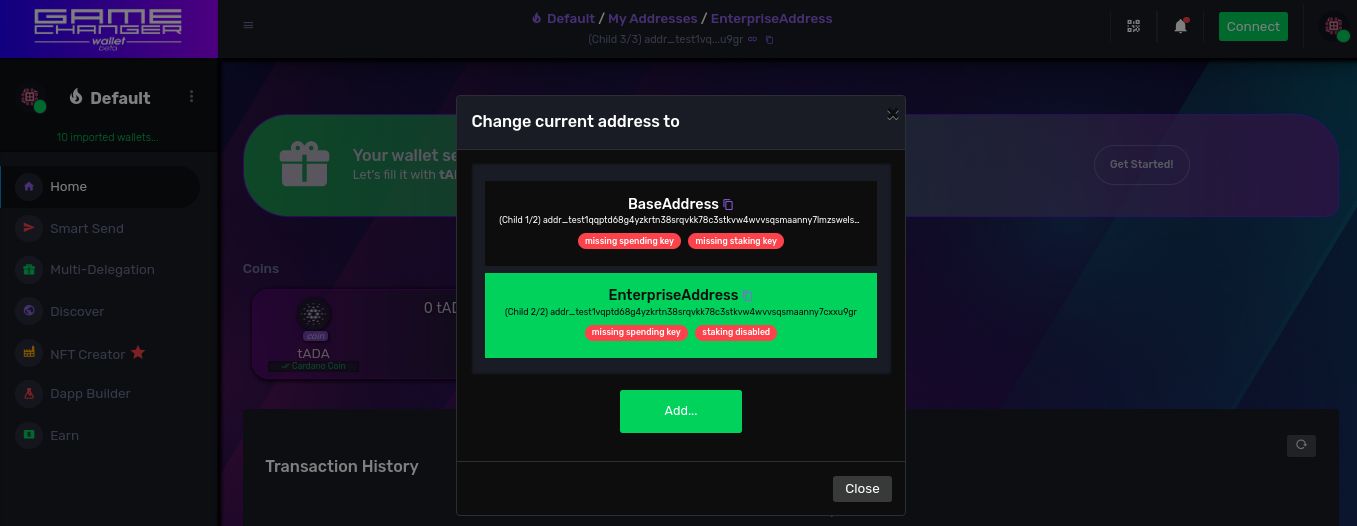
Key findings:
- Reward Addresses are not listed on Address Picker because are considered internal artifacts used for staking operations only
- BaseAddress and EnterpriseAddress are built using key hashes of key artifacts you do not have on your workspace, and for security reasons GameChanger Wallet is notifying you about this with the missing spending key and missing staking key red badges. This means you are not the owner of the keys required to fully own these addresses. Only multisig transactions will allow you to spend or stake those funds, otherwise you are watching them in a passive read-only mode
- on some address types like enterprise addresses a badge also indicates that some operations are disabled due to lack of credentials, like the staking disabled badge on EnterpriseAddress.
- these 3 addresses where created statically: you used constant values for key hashes and this means that every time you run this script you will produce the exact same result, a result that is not customized based on your own keys.
</br>
On my wallet on desktop, on your wallet on mobile, and on a wallet on an International Space Station device we will always obtain these 3 addresses on Cardano Pre-Production Testnet:
| Artifact Name | Address |
|---|---|
| BaseAddress | addr_test1qqptd68g4yzkrtn38srqvkk78c3stkvw4wvvsqsmaanny7lmzswelsnc0337p4eyyd68cy5mrgv29tqnfqjnzn2fvzlqy429lh |
| EnterpriseAddress | addr_test1vqptd68g4yzkrtn38srqvkk78c3stkvw4wvvsqsmaanny7cxxu9gr |
| RewardAddress | stake_test1ura3g8vlcfu8cclq6ujzxaruz2d35x9z4sf5sff3f4ykp0scj3du3 |
</br>
and these exact addresses on Cardano Mainnet:
| Artifact Name | Address |
|---|---|
| BaseAddress | addr1qyptd68g4yzkrtn38srqvkk78c3stkvw4wvvsqsmaanny7lmzswelsnc0337p4eyyd68cy5mrgv29tqnfqjnzn2fvzlq8rh9ng |
| EnterpriseAddress | addr1vyptd68g4yzkrtn38srqvkk78c3stkvw4wvvsqsmaanny7cawge8x |
| RewardAddress | stake1u8a3g8vlcfu8cclq6ujzxaruz2d35x9z4sf5sff3f4ykp0slcm0cv |
</br>
Notice that Cardano uses an encoding algorithm known as Bech 32 to encode Shelley-Era addresses and other items, and these allow to add human-readable prefixes to items to mark what these are
| Address Type | Mainnet Prefix | Testnet Prefix |
|---|---|---|
| Base & Enterprise | addr1 |
addr_test1 |
| Reward | stake1 |
stake_test1 |
</br>
Dynamic Workspace Design
Let’s now adapt the static workspace design to became dynamic: to adapt automatically to the wallet that is running it, to it’s own point of view (pov).
For this matter, lets replace these statically-generated address artifacts into addresses built using key artifacts you can own.
Please wipe your workspaces to continue with a clean testing wallet setup.
{
"type": "script",
"title": "Building addresses dynamically ",
"description": "Exploring different ways to build addresses",
"run": {
"usingWorkspaces": {
"type": "loadConfig",
"updateId": "addresses-exercise-2",
"layers": [
{
"type": "Workspace",
"items": [
{
"namePattern": "my_addresses",
"titlePattern": "My Addresses",
"descriptionPattern": "My custom addresses!"
}
]
},
//let's derive 2 random child keys from your master private key
{
"type": "Key",
"workspaceIds": [
"my_addresses"
],
"items": [
{
"namePattern": "my_spend_key",
"pathPattern": "m/1852h/1815h/3h/0/123"
},
{
"namePattern": "my_stake_key",
"pathPattern": "m/1852h/1815h/5h/2/456"
}
]
},
//let's define these addresses using the key hashes of the previous keys, by artifact name reference!
{
"type": "Address",
"workspaceIds": [
"my_addresses"
],
"items": [
{
// Example Base Address: 1 spend and 1 stake credentials linked to your keys by name
"namePattern": "BaseAddress",
"spendPubKeyName": "my_spend_key",
"stakePubKeyName": "my_stake_key"
},
{
// Example Enterprise Address: 1 spend credential linked to your key by name
"namePattern": "EnterpriseAddress",
"spendPubKeyName": "my_spend_key"
},
{
// Example Reward Address: 1 stake credential linked to your key by name
"namePattern": "RewardAddress",
"stakePubKeyName": "my_stake_key"
}
]
}
]
}
}
}
🔍 See also: loadConfig, script
On your wallet, on Workspaces page, the new My Addresses workspace will look similarly to this one on my wallet:
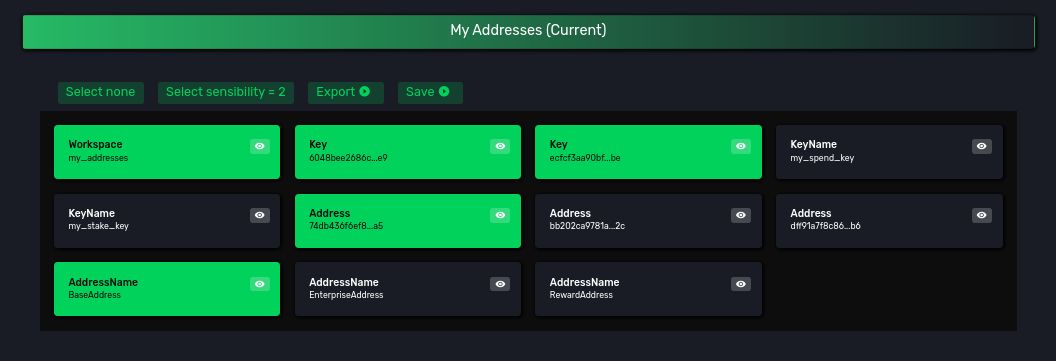
When you select the My Addresses workspace as current, your Address Picker will look similarly to mine:
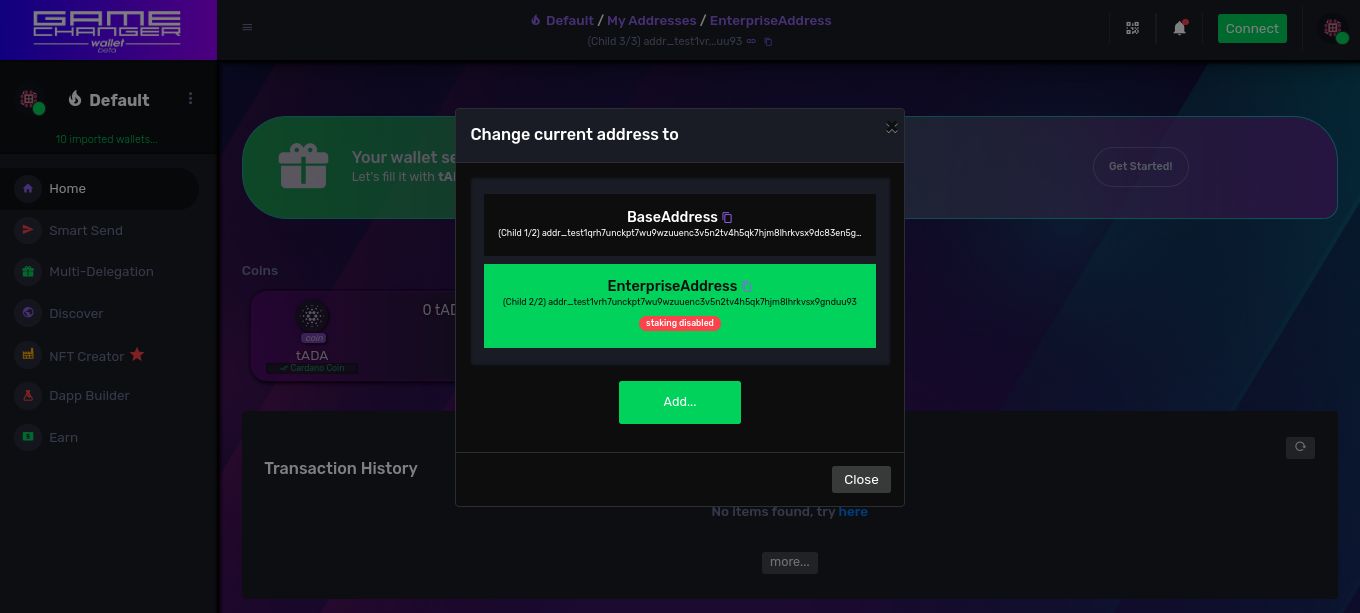
Key findings:
- BaseAddress and EnterpriseAddress were built this time using your own public keys, using key hashes of key artifacts you do have on your workspace, so now the missing spending key and missing staking key red badges are gone. This means you are the owner of the keys required to fully own these addresses. Multisig is not needed to for making transactions locally, on your owned addresses.
- these 3 addresses where created dynamically: you used name artifacts for referencing key hashes automatically underneath script execution context and this means that every time you run this script on any other wallet, with different private keys, you will produce different address and key results, results that are customized based on end user wallet pov.
- play with the artifact selection tool to audit the artifact dependency tree. Check how
BaseAddressname artifact connects to74db436f6ef8...a5address artifact, which connects to6048bee2686c...e9spend key artifactecfcf3aa90bf...bestake key artifact
One same gcscript source code for all users. Static, wallet-agnostic source code dapp connection with dynamic, wallet-specific execution results based on user pov. No wallet-specific private nor secret data leaked hardcoded on code nor workspace parameters, safe for web transport or for serialization for backup and disaster-recovery purposes…
This is the GameChanger Wallet way, novel design principles made for modern web3 wallet management and dapp connections.
The Main Address
We define as Main Address the base address that is generated out of
- Main Spend Key key-hash as credential
- Main Stake Key key-hash as credential
On gcscript:
{
"type": "script",
"title": "My Main Address",
"description": "Generating an alias of your wallet's Main Address",
"run": {
"usingWorkspaces": {
"type": "loadConfig",
"updateId": "addresses-exercise-3",
"layers": [
{
"type": "Workspace",
"items": [
{
"namePattern": "my_addresses",
"titlePattern": "My Addresses",
"descriptionPattern": "My custom addresses!"
}
]
},
{
"type": "Key",
"workspaceIds": [
"my_addresses"
],
"items": [
{
"namePattern": "my_main_spend_key",
"pathPattern": "m/1852h/1815h/0h/0/0"
},
{
"namePattern": "my_main_stake_key",
"pathPattern": "m/1852h/1815h/0h/2/0"
}
]
},
{
"type": "Address",
"workspaceIds": [
"my_addresses"
],
"items": [
{
"namePattern": "MyMainAddress",
"spendPubKeyName": "my_main_spend_key",
"stakePubKeyName": "my_main_stake_key"
}
]
}
]
}
}
}
🔍 See also: loadConfig, script
The Default Address
GameChanger Wallet introduced on Cardano new non-custodial wallet types, two of them were created for fast and easy onboarding and testing purposes:
- Burner Wallets : a seed phrase based wallet type, which is encrypted by a device-managed password, and stored on your browser local storage. This wallet type is inspired by the Burner Wallet Collective and allow a very fast user experience for short-term tasks and developer environment.
- Gift Wallets : a seed phrase based wallet type, which is encrypted by password and encoded as QR codes you can scan to later import providing the right password. It leverages on same encryption algorithm most wallet software use on Cardano to allow users to produce wallets, even at scale, for events, classrooms, for testing and onboarding purposes.
These 2 special types are not advised as long-term personal wallets as they are disposable, short-term wallets, marked as so by an ethical feature that triggers in-wallet suggestions to take a better course of action to users.
Default Address: is the address the user interface imports out-of-the-box for each wallet. On short-term types it is slightly different to Main Address to encourage users to avoid using these types as long-term personal wallets. It is generated this way:
- on short-term wallet types like Gift and Burner wallets:
- Main Spend Key key-hash as credential
- GameChanger Managed Stake Key key-hash as credential
- on long-term personal wallet types like Mnemonic, Express, Browser Extension and Hardware wallet types:
- Main Spend Key key-hash as credential
- Main Stake Key key-hash as credential
In both scenarios users can still access their Main Address, Main Spend Key and Main Stake Key, only on short-term wallet types this default address uses a different stake credential to incentivize users to move into a personal wallet type. Only affected features are the stake-related ones, but users have always full spending control of the funds.
Here we can see one on a Gift Wallet:
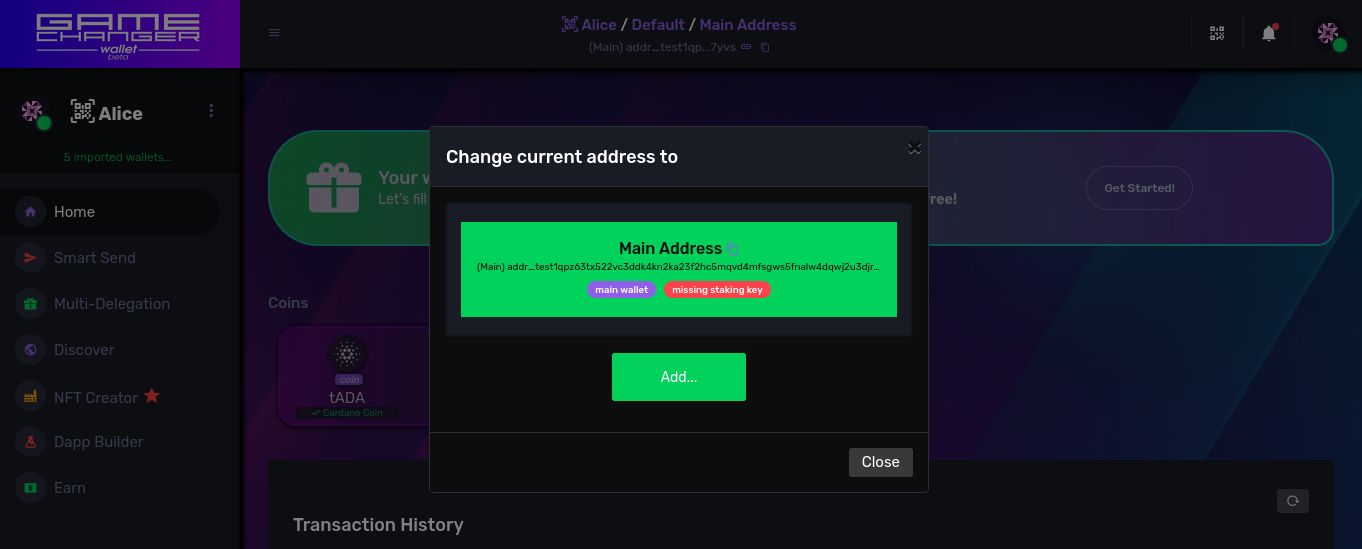
Notice how the red missing stake key badge matches the lack of this specific staking key on these wallet types.
The Default Workspace
The Default workspace is a special one that you cannot remove, that will be always present on your Workspace Picker as first choice, and that only contains your Default Address.
Here we can see one on a Gift Wallet:
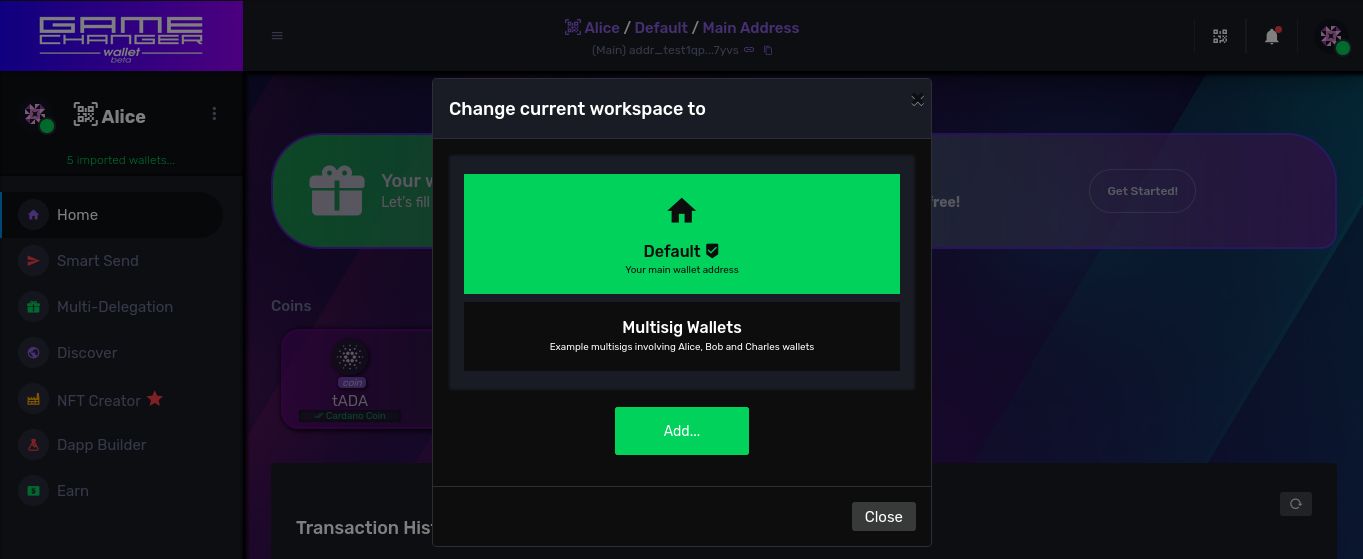
On next chapter we will learn security tips and how to differentiate across these workspace types.
| Previous: Keys | Next: Personal Account Wallets |

